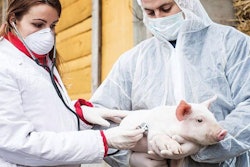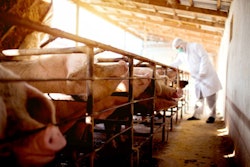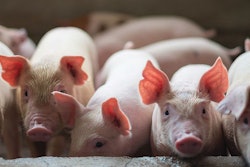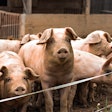
Effective surveillance and containment are key to the control of African swine fever (ASF), according to the European commissioner.
In the European Union (EU), the ASF situation remains “very challenging,” according to the Commissioner for Health and Food Safety.
After the Agriculture and Fisheries Council meeting this week, Commissioner Stella Kyriakides highlighted the recent jump in the infection to unexpected locations in Italy and Germany. According to her, this spread was caused by human actions.
For the EU and the pig industry, preventing, controlling and eventually eradicating ASF continue to be key ambitions, she said.
That the disease has been eradicated in Belgium, the Czech Republic and Greece is cause for optimism, said the commissioner. Where there is a risk of the disease, there needs to be continuous surveillance, and immediate containment when a case is detected.
Looking ahead, Kyriakides said the EU will fund research and trials to develop a vaccine against ASF. Until vaccination becomes an option, she supports member states’ public awareness campaigns.
Last year, almost 800,000 pigs died or were culled because of ASF, the commission said.
Early signs of potential surge in ASF cases in domestic swine
In Poland this month, cases were detected at two farms in Greater Poland (Wielkopolskie), according to the nation’s chief veterinary office. First to be affected was a herd of almost 2,000 pigs including 175 sows on June 3. Within a week, some of the 88 pigs at a farm in a neighboring county tested positive for the ASF virus. Located in the center-west of Poland, this province continues to report new cases of the disease in wild boar.
In Italy, ASF virus has been detected in wild boar in the northwest since January, and in the central region of Lazio since early last month.
The nation’s domestic pigs remained free of the disease until this month, when Italy registered its first cases in a small herd in Lazio.
Latest update from the EC puts the number of outbreaks in Italy’s domestic pigs at three.
To support affected swine producers and the national pig industry, the national farming body, CIA has called for immediate government payments of EUR50 million (US$52.5 million).
Last month, the southwest German state of Baden Wurttemberg confirmed its first ASF cases. Source of infection among the free-range pig herd remains unknown, according to Schweine. Cause of death of a wild boar found dead in the area has been attributed to another pathogen.
Overview of ASF in Europe’s domestic pigs
As of June 10, 10 European states had officially confirmed one or more ASF outbreaks among domestic pigs so far this year. This is according to Animal Disease Information Notification System operated by the European Commission (EC). Latest state to confirm its first ASF cases in 2022 is Poland.
For the year so far, the region’s outbreaks in commercial and backyard pigs had reached 189. Of these, 163 were in Romania. In Serbia, 11 outbreaks in swine have been registered in 2022 up to February 10.
Previously this year, Bulgaria, the Republic of Macedonia, Germany, Moldova, Slovakia and Ukraine had registered one of more ASF outbreaks in pigs.
Over the past week, Romania and Ukraine have notified the World Organisation for Animal Health (WOAH; formerly OIE) about new outbreaks.
For Ukraine, the cases were detected in a small backyard herd in the northeastern province of Sumy. ASF was last detected in this region in September 2020.
In ongoing outbreak series, Romania’s veterinary authority has confirmed with WOAH three new outbreaks. Affected were a total of 11 pigs in non-commercial herds.
This month, Moldova’s animal health agency has declared to WOAH that the ASF situation has been resolved in two western districts. Around the start of this year, there were three outbreaks in Briceni — one in a backyard herd and two in wild boar — and one at a small farm in Riscani. No new cases have been detected there since February.
Wild boar outbreaks approach 4,000
So far this year, 3,941 ASF outbreaks among wild boar have occurred in Europe, according to the EC notification system (as of June 10).
So far recording the most outbreaks in 2022 has been Poland (1,209), followed by Germany (870), Hungary (362), Slovakia (337), Romania (311) and Bulgaria (236). Since the previous update on May 27, Italy, Latvia and Lithuania have also notified the EC of new outbreaks.
For comparison, 12 countries registered with the EC one or more ASF cases in wild boar — a total of 12,150 outbreaks — during the whole of 2021.
Recent reports from Poland’s chief veterinary office confirms a further 33 ASF outbreaks involving 47 wild boar. Suspected during the period May 22 to June 6, these animals were found in seven provinces. They bring to 1,087 the nation’s total wild boar outbreaks so far this year, according to this source.
In Germany, ASF was first detected in September 2020.
Since then, 3,982 wild boar have tested positive for the ASF virus (as of June 17), according to national veterinary agency, the Friedrich-Loeffler Institute. Wild animals have tested positive for ASF in three eastern German states — Brandenburg, Saxony and Mecklenburg-West Pomerania.
After further cases of ASF in wild boar in previously affected areas, authorities in Saxony have announced extensions to restriction zones in two districts, according to Schweine.
Russia reports new cases, outbreak series closed
Not covered by the EC system is Russia. However, the national veterinary agency reports that ASF virus has been detected again in the Republic of North Ossetia-Alania. Affected was one wild boar in the east of the region, and it was culled, according to the WOAH notification.
Part of Russia’s North Caucasus federal district, North Ossetia was declared free of ASF in March. This came after just one outbreak involving four wild boar in the same district in January 2021.
In contrast, the ASF situation in the Southern federal district oblast of Rostov has been resolved. According to WOAH notifications, just one group of wild boar tested positive for the ASF virus in March. No further cases have been reported since that time.
View our continuing coverage of the global African swine fever situation.


















